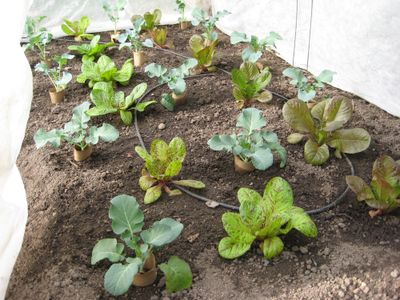Organic practices can deter insects, diseases

Even though the gardening season is getting off to a slow, chilly start, it’s never too soon to be thinking about ways to deal with insect pests. I take an organic approach to this because the whole point of growing your own food is to produce safe, healthy vegetables and fruits, right?
The best method for avoiding insect problems and disease is to keep your plants as healthy as possible. Water them regularly, make sure they’re spaced properly and provide them with plenty of nutrients for growing.
Nutrients can come in the form of organic soil amendments like compost or well-rotted manure. Organic fertilizers such as fish emulsion, seaweed extract, kelp meal and other natural products can be found at garden centers.
Read the labels to determine the nutrients they contain. N stands for nitrogen and helps plants grow leaves. P stands for phosphorus and primarily stimulates root growth. K stands for potassium, which regulates photosynthesis and gives plants the ability to fight off disease.
When it comes to dealing with insects, the most important rule is to correctly identify them. In addition to the garden pests out there, our gardens are blessed with many beneficial insects, like lady beetles and their larvae, green lacewings, praying mantis, spiders and predatory beetles.
If you just cringed at the thought of some of those beneficials, that’s understandable, but it’s important to take advantage of our little allies.
I’m fortunate in that I have very few harmful insects in my garden. Why? It’s because I have established a balanced ecosystem out there.
I’ve attracted birds to the area by putting up birdhouses, setting out birdbaths and feeders, and planting shrubs to provide them with shelter from predators. In return, they eat plenty of insects for me.
I don’t use chemicals, which have the potential to kill harmful and beneficial insects alike. On crops that are particularly prone to insect damage, I use a floating row cover – woven fabric that lets in light, moisture and air but provides a physical barrier to keep insects out.
This applies to the cole crops – broccoli, Brussels sprouts, cabbage and cauliflower – which are commonly attacked by aphids and cabbage loopers. Floating row covers will also keep leaf miners away from susceptible plants like spinach and Swiss chard. Be sure to remember that a floating row cover can’t be left on plants that need to be pollinated.
If there is insect damage that needs to be controlled, I look for products that are safe to use on edible crops. For example, the caterpillar stage of most insects can be controlled with Bt, Bacillus thuringiensis. This product contains bacteria that are harmful to them but safe for humans.
Aphids can be sprayed off a plant with a strong jet of water from the hose, or they can be sprayed with an insecticidal soap if you’re really desperate.
Tomato hornworms can be hand-picked from plants or they can be sprayed with Bt. The larva of Colorado potato beetles can be controlled with the “San Diego” strain of Bt.
One of the best weapons in your arsenal is diligence. This means wandering through your garden on a regular basis so you can spot problems as they’re starting and nip them in the bud.
In most cases, the solution will be to trim off the affected portion of the plant, which is certainly more desirable than having to use a spray.
I hope these suggestions will make it easier for you to use organic practices in your garden this season.